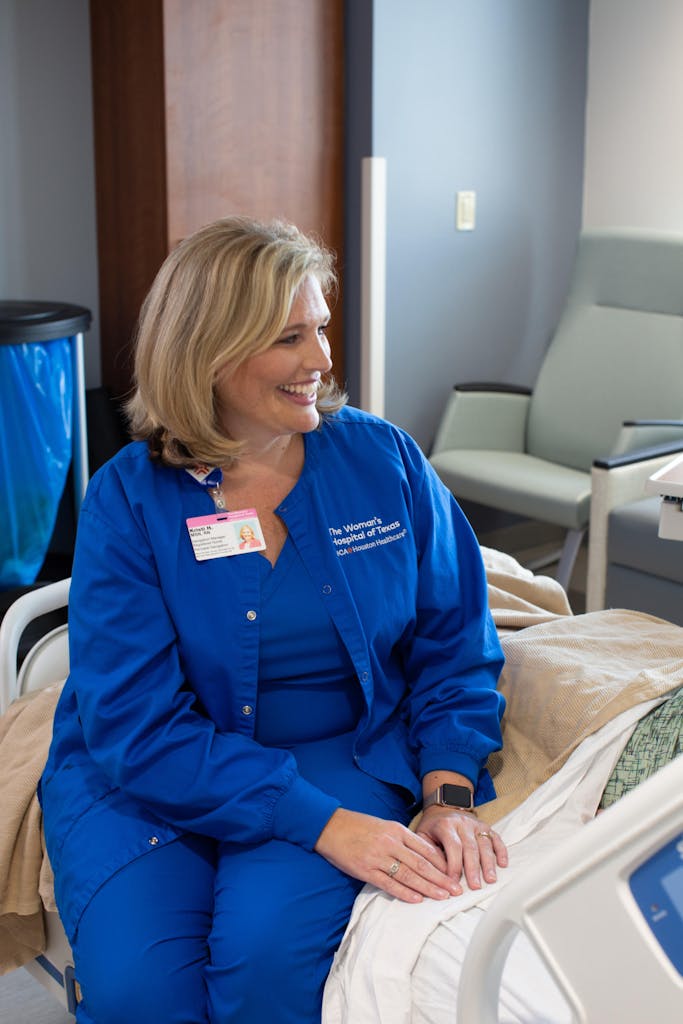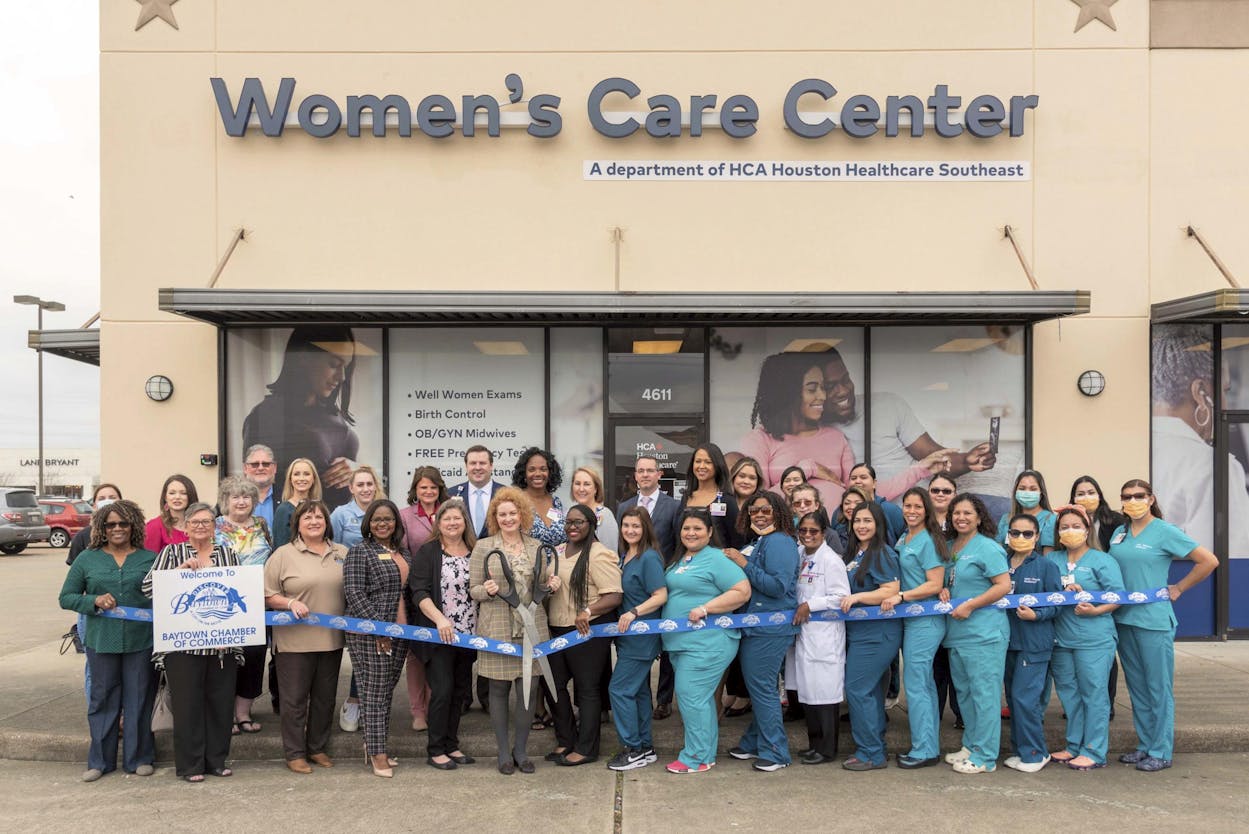When you or a family member have concerns about your health, where do you go? If you don’t have a doctor nearby, you’ll likely go to the closest place available, somewhere just a short drive from your home.
Jenn Bowman understands that decision; she’s made it herself more than a few times.
“As a healthcare consumer, you’re often making split-second decisions on where you’re getting your care,” she says. “I’m a mother; I get it. If you need care, your first thought will always be, ‘What’s available? What’s close?’”
But that’s the beauty of HCA Houston Healthcare, she says: The family of hospitals includes multiple points of entry conveniently located near their patients, thereby truly epitomizing “patient-centered care.”
“In today’s landscape, we have urgent cares and free-standing ERs and quality care in your own backyard,” Bowman adds, “and even if patients choose the wrong location of care first, we have processes and practices in place to help course-correct within our system of facilities.”
Bowman is the vice president of patient experience for HCA Healthcare’s Gulf Coast Division, which includes HCA Houston Healthcare, one of Houston’s largest families of hospitals. She has an expansive view of the holistic, compassionate care her colleagues provide—and the caretakers who provide it.
One of those caretakers is Jeanna Bamburg, FACHE, chief executive officer at HCA Houston Healthcare Southeast, and a veteran healthcare leader who shares Bowman’s zeal for the family of hospital’s multiple points of entry.
“The proximity to patients’ homes is one of the key benefits of having so many access points,” says Bamburg. “The whole point is easy access, and by providing that, we can address critical disparities in healthcare.”
Bamburg’s work is personal. “I have a passion for taking care of women and babies,” she says.
After years of doing just that, Bamburg helped establish HCA Houston Healthcare’s first Women’s Care Center: a facility that uses a unique collaborative model to offer a wide variety of services to the community.
The first Women’s Care Center opened in 2008, after beginning as an inpatient service in 2003, and nearly two decades later, four such facilities are spread throughout south Houston. These centers offer everything from prenatal care to breastfeeding assistance and family planning, and are staffed by certified nurse midwives and women’s health nurse practitioners, with a medical director physician moments away. To Bamburg, the goal is to provide and connect all the options a patient wants or needs.
That’s a key word: connection. With the patient’s needs and comfort always in focus, Bamburg and her colleagues make the connections that are vital to exemplary care and, in many cases, lifesaving. Take perinatal navigation, for instance.
HCA Houston Healthcare’s perinatal navigation program is an excellent case study for the power and efficacy of this hospital system’s patient-centered care. Patients are eligible for this kind of navigation when they have a high-risk pregnancy due to either a maternal or fetal diagnosis. The words “high-risk” can strike fear into the heart of any mother, but the HCA Houston Healthcare care team is equipped and ready to provide the technical and emotional support these families need. Or, as Bamburg’s fellow leader Kristi Hardy puts it, she and her team are ready to “be the village” for expectant mothers who may not have strong support systems.
“We build each patient a team from the ground up,” explains Hardy, MSN, RN. “We’re asking questions like, ‘Do they have a maternal fetal medicine specialist? Do they have an obstetrician?’ We pull all of these clinical care teams together, so the patient feels comfortable and resourced.”

Kristi Hardy’s job is personal, too. In 2015, the healthcare leader was facing her own daunting health challenge: a breast cancer diagnosis that, understandably, created far more questions than answers. Amidst that uncertainty, she discovered the power of navigation—a process by which nurses, physicians, and specialists curate a personalized plan for the patient. Just as importantly, they walk alongside the patient throughout that treatment plan.
“Navigation was a game-changer,” she says, years after beating breast cancer. “I got the care and direction I needed at a time when everything felt up in the air.”
Now, she’s paying it forward in the best way possible.
As Perinatal Navigation Manager at HCA Healthcare Gulf Coast Division, Hardy helps guide expectant mothers through the emotional and physical challenges of high-risk pregnancies. Many of these mothers have comorbidities that make their pregnancies more complex, and some of them even have cancer.
“We make our patients feel like VIPs,” Hardy says. “This may not be the journey they signed up for, but we’re here to help the whole family have clarity and confidence in every step of their treatment.”
Hardy oversees navigation programs at The Woman’s Hospital of Texas and HCA Houston Healthcare Clear Lake, which are both part of HCA Houston Healthcare. As such, they are plugged into a vast and multi-faceted network of care that includes diverse facilities like the emergency rooms and women’s care centers described above. These many diverse points-of-entry help Hardy and her colleagues meet people where they are at, literally—and help ensure patients get on the right care pathway.
Furthermore, Hardy and her team are dedicated to supporting each family’s unique journey. They’ve worked with members of the LGBTQ community who never thought they’d be able to start a family. They’ve worked with surrogate mothers whose child, once born, will be living with their family in Ireland or Argentina. They’ve supported patients who have grappled with pretty much every comorbidity you can think of, from diabetes to cancer. Each of these patients have access to co-navigation, an asset that further elevates their experience and often leads to powerful connections. If, for example, a patient is navigating both a pregnancy and a cancer diagnosis, professionals like Hardy will connect them to navigators for both, thereby ensuring the most comprehensive care possible.
The healthcare leader is also quick to emphasize that she and her team do not replace the care provided by a primary physician; they complement it.
“We call ourselves ‘unicorns,’ because we’re unique and it can be difficult to sum up what we do in one word,” Hardy says. “But any way you can have a family, we want to support you in that.”
Sometimes that support is complex. For instance, navigation teams must determine which of their patients’ symptoms are indeed symptoms of their illness. Then, they must implement a comprehensive treatment plan that considers the baby’s health, too.
However, because of the many points of access provided by their family of facilities, the clinical care teams of HCA Houston Healthcare strive to save valuable time by getting their patients on the right care pathway.
As Bowman points out, each of these facilities has a distinct value and expertise they provide for their patients. Yet they all have one thing in common, an intangible asset that she and Hardy know, from personal experience, is critical to offering the best care possible.
“The thing that sticks out, no matter which HCA Houston Healthcare facility you go to, is the heart our colleagues have for their patients,” Hardy says. “We care like one big family.”






